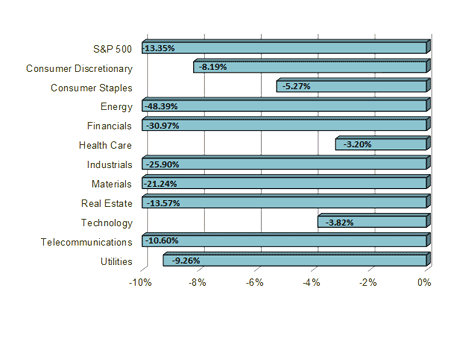Weekly Market Snapshot
Chief Economist Scott Brown discusses the latest market data.
COVID-19 has affected data collection for key economic reports, making the reported data somewhat suspect. However, the direction is clear. Looking through the noise, it appears that the economy contracted in the first quarter and 2Q20 will be much worse. However, stock market participants have been more focused on the prospects for ending social distancing and getting the economy back to normal.
Retail sales were reported to have fallen 8.7% (-6.2% y/y) in March – down at a 9.2% annual rate in 1Q20 (relative to 4Q19). Grocery stores, online shopping and (implicitly) warehouse clubs did well, but department stores, clothing stores and auto dealers suffered badly.
Industrial production fell 5.4% in March, with manufacturing output down 6.3% (-6.4% y/y) – down at a 7.1% annual rate in 1Q20. Single-family housing permits fell 12.0% (following strong gains in January and February). The Conference Board’s Index of Leading Economic Indicators posted its largest decline ever.
Jobless claims fell to “only” 5.245 million in the week ending April 11. Prior to seasonal adjustment, 20.1 million people (more than 12% of the labor force) have filed a claim in the last four weeks.
Next week, jobless claims will remain the key economic data report to watch (these figures are timely and relatively accurate). Home sales are expected to have fallen in May. Durable goods orders should see a large decline, with a bigger drop likely in April. The UM Consumer Sentiment figure fell sharply in late March and early April. A further decline is expected in the full-month reading.
Indices
| Last | Last Week | YTD return % | |
|---|---|---|---|
| DJIA | 23537.68 | 23433.57 | -17.52% |
| NASDAQ | 8532.36 | 8090.90 | -4.91% |
| S&P 500 | 2799.55 | 2749.98 | -13.35% |
| MSCI EAFE | 1582.04 | 1581.06 | -22.33% |
| Russell 2000 | 1178.09 | 1191.66 | -29.39% |
Consumer Money Rates
| Last | 1 year ago | |
|---|---|---|
| Prime Rate | 3.25 | 5.50 |
| Fed Funds | 0.00 | 2.40 |
| 30-year mortgage | 3.38 | 4.37 |
Currencies
| Last | 1 year ago | |
|---|---|---|
| Dollars per British Pound | 1.246 | 1.304 |
| Dollars per Euro | 1.084 | 1.130 |
| Japanese Yen per Dollar | 107.92 | 112.06 |
| Canadian Dollars per Dollar | 1.408 | 1.334 |
| Mexican Peso per Dollar | 24.023 | 18.821 |
Commodities
| Last | 1 year ago | |
|---|---|---|
| Crude Oil | 19.87 | 63.76 |
| Gold | 1731.70 | 1276.80 |
Bond Rates
| Last | 1 month ago | |
|---|---|---|
| 2-year treasury | 0.21 | 0.38 |
| 10-year treasury | 0.65 | 1.00 |
| 10-year municipal (TEY) | 1.78 | 3.68 |
Treasury Yield Curve – 04/17/2020

As of close of business 04/16/2020
S&P Sector Performance (YTD) – 04/17/2020

As of close of business 04/16/2020
Economic Calendar
| April 21 | — | Existing Home Sales (March) |
| April 22 | — | Jobless Claims (week ending April 18) |
| — | New Home Sales | |
| April 24 | — | Durable Goods Orders (March) |
| — | UM Consumer Sentiment (April) | |
| April 28 | — | CB Consumer Confidence (April) |
| April 29 | — | Real GDP (1Q20, advance estimate) |
| — | FOMC Policy Decision | |
| — | Powell Press Conference | |
| April 30 | — | Jobless Claims (week ending April 25) |
| — | Personal Income and Spending (March) | |
| May 1 | — | ISM Manufacturing Index (April) |
| May 8 | — | Employment Report (April) |
All expressions of opinion reflect the judgment of the Research Department of Raymond James & Associates, Inc. and are subject to change. There is no assurance any of the forecasts mentioned will occur or that any trends mentioned will continue in the future. Investing involves risks including the possible loss of capital. Past performance is not a guarantee of future results. International investing is subject to additional risks such as currency fluctuations, different financial accounting standards by country, and possible political and economic risks, which may be greater in emerging markets. While interest on municipal bonds is generally exempt from federal income tax, it may be subject to the federal alternative minimum tax, and state or local taxes. In addition, certain municipal bonds (such as Build America Bonds) are issued without a federal tax exemption, which subjects the related interest income to federal income tax. Municipal bonds may be subject to capital gains taxes if sold or redeemed at a profit. Taxable Equivalent Yield (TEY) assumes a 35% tax rate.
The Dow Jones Industrial Average is an unmanaged index of 30 widely held stocks. The NASDAQ Composite Index is an unmanaged index of all common stocks listed on the NASDAQ National Stock Market. The S&P 500 is an unmanaged index of 500 widely held stocks. The MSCI EAFE (Europe, Australia, Far East) index is an unmanaged index that is generally considered representative of the international stock market. The Russell 2000 index is an unmanaged index of small cap securities which generally involve greater risks. An investment cannot be made directly in these indexes. The performance noted does not include fees or charges, which would reduce an investor’s returns. U.S. government bonds and treasury bills are guaranteed by the US government and, if held to maturity, offer a fixed rate of return and guaranteed principal value. U.S. government bonds are issued and guaranteed as to the timely payment of principal and interest by the federal government. Treasury bills are certificates reflecting short-term (less than one year) obligations of the U.S. government.
Commodities trading is generally considered speculative because of the significant potential for investment loss. Markets for commodities are likely to be volatile and there may be sharp price fluctuations even during periods when prices overall are rising. Specific sector investing can be subject to different and greater risks than more diversified investments. Gross Domestic Product (GDP) is the annual total market value of all final goods and services produced domestically by the U.S. The federal funds rate (“Fed Funds”) is the interest rate at which banks and credit unions lend reserve balances to other depository institutions overnight. The prime rate is the underlying index for most credit cards, home equity loans and lines of credit, auto loans, and personal loans. Material prepared by Raymond James for use by financial advisors. Data source: Bloomberg, as of close of business April 16, 2020.

